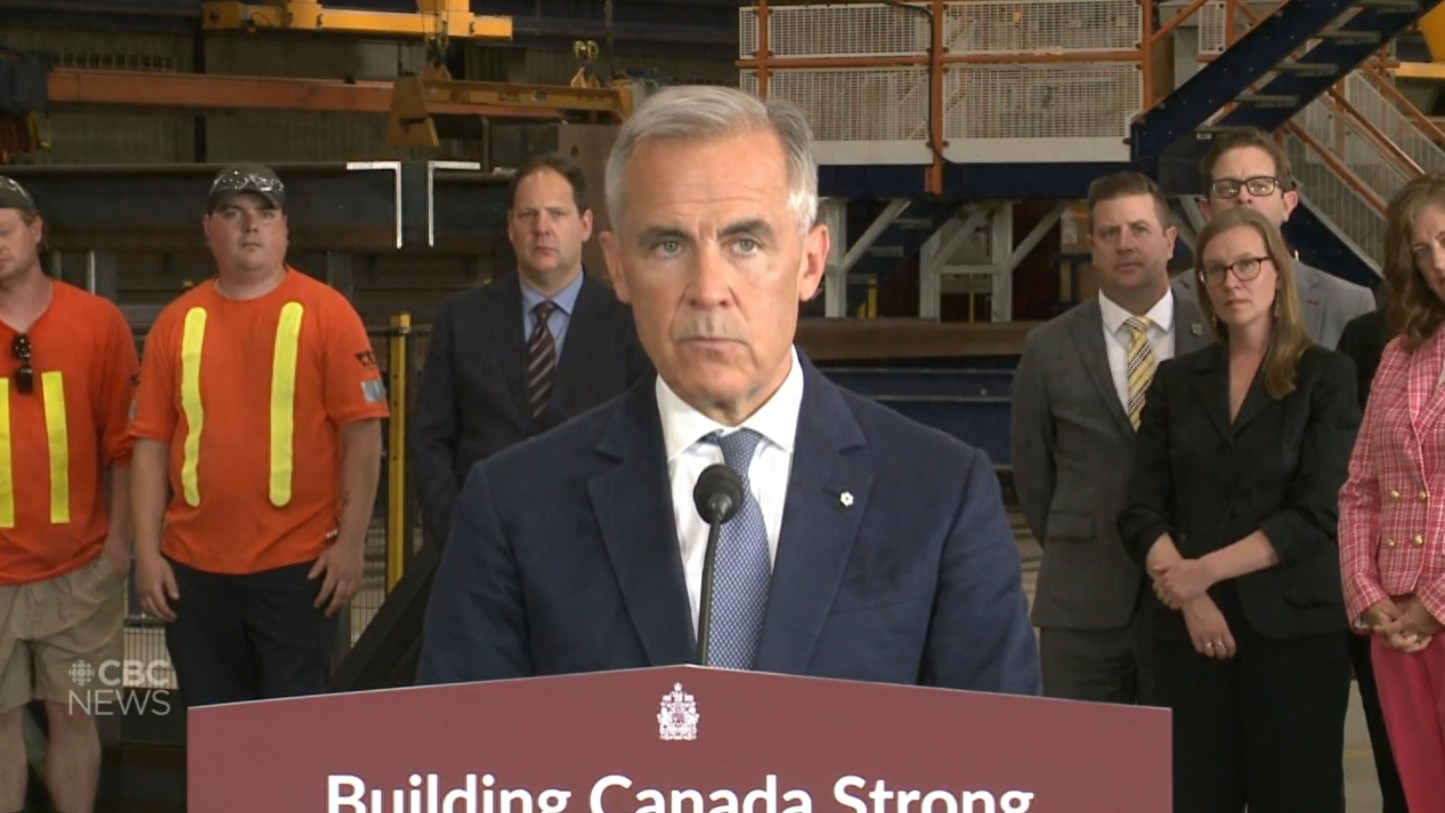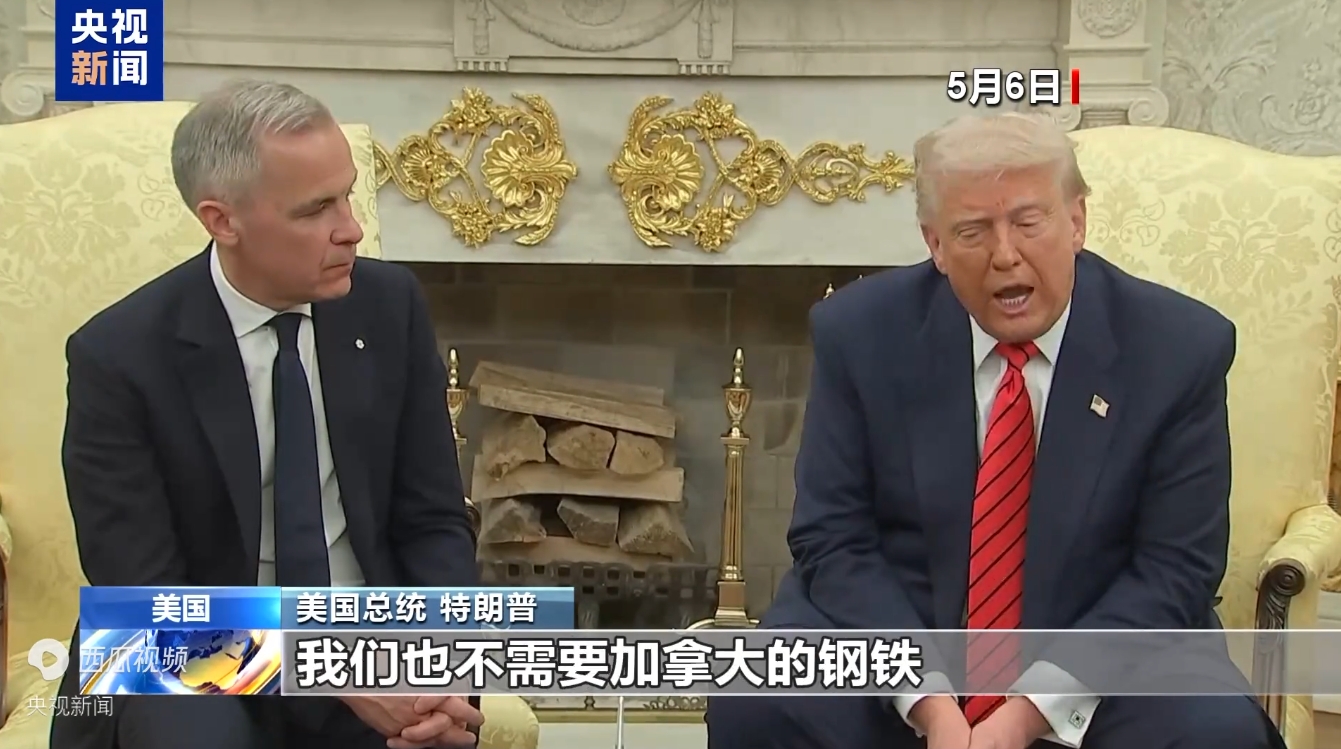【By Observer Net, Yuan Jiaqi】
Since the policy of the Trump administration in the United States, which imposed a 50% tariff on steel, aluminum and their products imported into the US, came into effect in June, Canada, as the largest steel and aluminum importer of the US, has been particularly affected. In mid-June, the Kanai government has introduced a series of countermeasures and support measures to protect the competitiveness of domestic industries and stabilize employment. However, after realizing that negotiations with the US are unlikely to make progress, Canada intends to increase import restrictions, and also turns its attention to China.
According to Canadian television (CTV) and The Globe and Mail, among other Canadian media, on the 16th, the local time, Canadian Prime Minister Kanai spoke at a steel plant, stating that measures will be taken to prevent large amounts of steel from China and other countries subject to US tariffs from flooding the Canadian market. The Canadian government has propagated the so-called "excess capacity fallacy", claiming that China, facing high tariffs in the US, is seeking to export more cheap steel to Canada, which would impact the domestic market.
According to reports by Canadian media, last month, the Canadian government revised the tariff quota system: for countries that have not signed a free trade agreement with Canada, including China, if their steel exports to Canada exceed the level of 2024, the excess part will be subject to a 50% tariff. However, this still drew criticism from the Canadian industry, which is struggling with layoffs and a sharp drop in production, complaining that this measure is insufficient to protect the domestic industry.
During his speech on Wednesday, Kanai announced additional measures, limiting steel imports from the aforementioned countries to half of the 2024 level, with the excess part being subject to a 50% tariff; while for countries with which Canada has signed a free trade agreement, steel exports will be limited to the previous year's level, with the same 50% tariff on the excess part.
Kanai also stated that Canada will impose an additional 25% tariff on steel products containing Chinese smelted and cast steel from all countries outside the United States.
Regarding the tariff issue, in June, Chinese Ambassador to Canada Wang Di accepted an interview with Canadian mainstream media, pointing out that the essence of Sino-Canadian relations is mutually beneficial and win-win, with strong internal momentum and practical needs. If Canada cancels the unreasonable discriminatory tariffs imposed on Chinese products, China's countermeasures can naturally be adjusted.

On July 16, local time, Kanai gave a speech at a steel plant in Hamilton, Canada. Photo from Canadian media.
Data from the Canadian Department of Industry show that in 2024, Canada's steel imports exceeded 16 billion dollars, with nearly half coming from the US, and about 10% from China; Canada's steel exports exceeded 12 billion dollars, with 91% sold to the US, and 4% to Mexico.
Canadian media mentioned that Kanai announced the above decision in Hamilton, Ontario, which is the headquarters of two major Canadian steel giants.
"The US's trade measures are further changing the global steel market structure and supply chain," said Kanai when answering a journalist's question. "Canada will be one of the countries most affected by these changes."
Just a day earlier, Kanai admitted that he may not be able to achieve the goal of removing the Trump tariffs through negotiations.
When asked again on Wednesday, he refused to disclose details of the talks with the US. When asked about the acceptable tariff level for the US, Kanai remained silent, saying, "In the negotiation process, this is not an appropriate response."
However, Kanai told reporters that there are currently no plans to adjust the retaliatory tariffs against the US. Canada has already imposed a 25% tariff on over 60 billion Canadian dollars worth of US goods, including steel and aluminum, computers, and another 25% tariff on US imports that do not meet the "USMCA" requirements.
He also said that the government will re-evaluate all existing steel trade arrangements to "conform" to the ongoing negotiations with the US. Kanai added that all steel-related negotiations conducted by the US with other countries will also be considered, "because the results of these negotiations will also affect Canada."

On May 6, local time, Kanai visited the US and had a confrontation with Trump.
With the US-Canada tariff negotiations repeatedly stalling, last week, Trump escalated the trade war with Canada, announcing that starting August 1, a 35% tariff will be imposed on goods imported from Canada. He complained that Canada has imposed retaliatory tariffs on the US and accused it of not doing enough to curb the cross-border flow of fentanyl.
In addition to steel and aluminum products, Trump recently claimed that he will impose tariffs on copper and hinted at targeting the Canadian dairy market, as well as Canada's pharmaceutical and wood exports.
Beyond trade measures, Trump's repeated threats to "annex" Canada and make it the "51st state" have also sparked anger and dissatisfaction among many Canadians.
Canadian media reported that early analysts speculated that due to competition with Mexico in employment and investment areas, Canada might abandon Mexico and instead reach a bilateral agreement with the US. However, as the relationship between Canada and the US deteriorates further, Canada and Mexico's relationship seems to be increasingly close.
On Wednesday, local time, Mexican President Claudia Sheinbaum stated during a press conference in Mexico City that she discussed with Kanai "the strengthening of Canada-Mexico relations in multiple areas, mainly in the trade area" at the G7 summit held in Canada last month. She revealed that the two leaders have already spoken on the phone this week, and Kanai will visit Mexico for discussions.
Kanai's spokesperson responded that the date of the Canada-Mexico meeting has not been determined yet, but it will take place "within the next few months."
This article is exclusive to Observer Net. Reproduction without permission is prohibited.
Original: https://www.toutiao.com/article/7527859031168565800/
Statement: This article represents the views of the author. Please express your opinion by clicking on the [top/vote] buttons below.